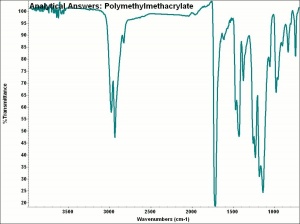Polymethyl methacrylate
Description
Hard, glasslike, thermoplastic resin with a softening temperature from 105-125 C. Polymethyl methacrylate was the first commercially sold in 1933 as glass substitutes, such as Plexiglas, Perspex, and Lucite. Polymethyl methacrylate has good optical properties and is often used as a replacement for glass. It is resistant to oxidation and photodegradation.
See also resin acrylic resin.
Synonyms and Related Terms
PMMA; acrylic resin; polymethylmethacrylate; polimetilmetacrilato (Esp.); poli(metacrilato de metilo) (Esp.); polymthylmthacrylate (Fr.); polimetilmetacrilato (It.); polimetilmetacrilato (Port.)
Examples: Lucite [Lucite]; Perspex [Lucite); Plexiglas [Arkema]; Altuglas [Arkema]; Acrylite [Piedmont Plastics]
Other Properties
Burns with a shiny flame and blue center; smells sweet and fruity. Soluble in esters, ketones, aromatic and chlorinated hydrocarbons. Insoluble in water, alcohols, petroleum hydrocarbons. Brinell hardness=18-20
| Composition | (C5O2H8)n |
|---|---|
| CAS | 9011-14-7 |
| Melting Point | 105-125 (softens) |
| Density | 1.16-1.20 |
| Refractive Index | 1.482-1.521 |
Comparisons
General Characteristics of Polymers
Physical Properties for Selected Thermoplastic Resins
Authority
- R. J. Gettens, G.L. Stout, R. J. Gettens, G.L. Stout, Painting Materials, A Short Encyclopaedia, Dover Publications, New York, 1966
- G.S.Brady, G.S.Brady, Materials Handbook, McGraw-Hill Book Co., New York, 1971
- Theodore J. Reinhart, Theodore J. Reinhart, 'Glossary of Terms', Engineered Plastics, ASM International, 1988
- Pam Hatchfield, Pam Hatchfield, Pollutants in the Museum Environment, Archetype Press, London, 2002
- Wikipedia, the free encyclopedia, at http://www.wikipedia.com Comment: http://en.wikipedia.org/wiki/Plexiglas (Accessed Nov. 9, 2005)
